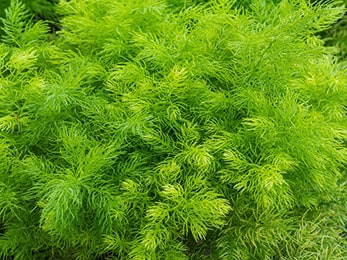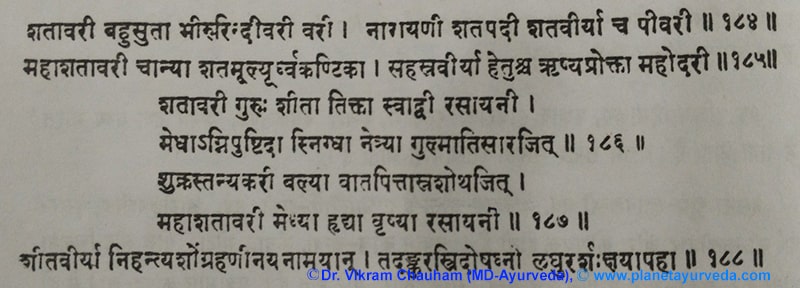Shatavari (Asparagus racemosus) - Shatavari Uses, Benefits and Effects on Dosha

Description of Shatavari Plant
Shatavari Plant is a perennial climbing plant with straight and hooked spines, extending to a height of 1- 2 meters. This is a sweet and bitter herb. Its young stems are delicate and brittle. Shatavari flowers having fragrance, white in color with small spikes. Shatavari Roots are white tuberous, radish shaped, tapered at end and are found in clusters. Older Shatavari plants have longer and thicker roots. Shatavari leaves are thin and pine needles. Shatavari Fruits are in the form of small berries that appear purple to black in color.
What is Shatavari
The name Shatavari interprets "she who possesses 100 husbands", stating herb with rejuvenative effects upon the female reproductive organs not only for young woman, even for women in their middle and elder years, to help them gracefully transition through the natural phases of life, including menopause. Shatavari efficiently helps in balancing Pitta Dosh. Ayurveda has entitled Shatavari as the Queen of herbs. It is the primary herb recommended for female health.
Shatavari is naturally blessed herb with medicinal properties as nutritive tonic, antacid, diuretic, rejuvenative, aphrodisiac, galactogogue, laxative, antispasmodic, antitumor, demulcent, anti-depressant, anti-microbial, anti-oxidant, adaptogenic and immunomodulator.
Chemical Constituents of Shatavari (Asparagus racemosus)
- Shatavari Root - Sarsapogenin, two spirostanolic, two Furostanolic sponins, Sitosterol, Asparagamine A
- Shatavari Fruits - B- sitosterol, Sarsasapogenin, Diosenin, Asparamins A & B.
- Shatavari Leaves - Flavonoids, Rutin.
Shatavari Classification
- Kingdom - Plantae
- Subkingdom - Tracheobionta
- Order - Asparagales
- Family - Asparagaceae
- Genus - Asparagus
- Species – Asparagus racemosus
Shatavari Habitat
Shatavari plant grows in tropical and subtropical forests. This plant grows well in light, medium and heavy soils. It is commonly found in Asia (the Himalayas, Nepal, Pakistan, India, Sri Lanka, Australia and also in Africa). In India, it is found mostly in Kerala, Tamil Nadu, Andhra Pradesh, Karnataka, Gujarat, Odisha and West Bengal. Due to deforestation, the plant is endangered in its natural habitats.
Shatavari Names
- Hindi Name - Shatavari
- English Name - Buttermilk Root, Climbing Asparagus, Wild Asparagus
- Kannada Name - Majjige Gadde
- Tamil Name - Sadavare
- Marathi Guajarati Name - Satavari
- Konkani Name - Satavari
- Assamese Name - Satomul
- Bengali Name - Satamuli, Dogri: Sainsarbel, Satmooli, Shatavar
- Gujarati Name - Shatavari
- Malayalam Name - Sathavari
- Manipuri Name - Nunggarei
- Oriya Name - Vari, Pali
- Punjabi Name - Chhotta Kelu
- Urdu Name - Satawar
- Arabic Name - Shakakul, Shaqaqul
- Chinese Name - Tian Men Dong
- Nepalese Name - Kurilo
Ayurvedic Properties of Shatavari
| Hindi / Sanskrit | English | ||
| Rasa | Madhura, Tikta | Taste | Sweet, Bitter |
| Guna | Guru, Snigdha | Physical Property | Heavy, Oily |
| Virya | Sheeta | Potency | Cold |
| Vipaka | Madhura | Metabolic Property (After Digestion) | Sweet |
Shatavari Effects on Dosha
It balances Pitta and Vata doshas.
| Charak Samhita | Sushruta Samhita | Vagbhata |
|
|
|
Ancient Verse about Shatavari (Asparagus racemosus)

The Bhavprakash nighantu edition of 1998: verse 174-177, page no-392-393.
The name and properties of small Shatavar are Shatavari, Bahusuta, Bheeru, Indeevari, Vari, Narayani, Shatapadi, Satavirya and Peevari.
The name and properties of large Shatavar are Mahashatavari, Satamuli, Urdhvakantaka,Shastravirya Hetu and Mahodari.
Small Shatavar - It is sweet and bitter in taste with cold potency. Small shatavari is rejuvenator, intellect promoter. It supports digestive fire. Increases stamina. Promotes spermatogenesis is a galactogogue. It manages vata pitta diseases and inflammation.
Big Shatavar - Good for heart, intellect, rejuvenative, aphrodisiac and cold in potency. It manages pile, ulcerative colitis and eye diseases.
Both types of Shatavari are good for tridoshaj disease, piles and managing emaciation.
References
The Bhavprakash nighantu with elaborated Hindi commentary by Padmashri prof. K.C. Chunekar, edited by Dr. G.S. Pandey: edition of 1998; verse - 174-177, page no. - 392 -393.
Shatavari Uses - Practical Uses of Asparagus Racemosus
Medicinal properties of Asparagus racemosus are nutritive, rejuvenative, aphrodisiac, laxative, galactogogue, antispasmodic, antacid, diuretic, antitumor, demulcent, anti-diarrheal, anti-depressant, anti-microbial, anti-oxidant, adaptogenic and as well it is immunomodulator in nature.
- A very potent herb to maintain the health of female reproductive system.
- Shatavari treats PMS symptoms just by relieving pain and controlling blood loss, supports already balanced female hormones
- It is extremely beneficial herb in amenorrhea, dysmenorrhea, leucorrhea and other pelvic inflammatory diseases.
- Supportive of male reproductive system as well.
- Shatavari can enhance the level of white blood cell count.
- It can stimulate macrophages which helps to combat candida.
- This herb helps to maintain healthy energy levels and strengthen the body.
- Good supporter for immune system.
- It is a very good natural antioxidant that helps in detoxification of body.
- Shatavari has the capability to balance the pH level of the vagina.
- It can nurture the body and cleanses dry membranes so that the fluids are balanced completely.
- This herb enhances the amount of breast milk for mothers and can also be consumed by women after hysterectomy.
- Shatavari nourishes the ovum which further increases fertility rate.
- The herb is even used in males to solve their sexual problems.
- It can bring about cooling effect and thereby lower fever, inflammation and even stomach ulcers.
- Shatavari has properties to fight against cholera, typhoid fever, dysentery, E.coli and Staphylococcus aerus.
- This herb is good to relieve stress by creating an immune response within the body which can protect the body from damaging effects like stress.
Shatavari Part Used
- Shatavari Roots
- Shatavari Leaves
Dosage
- Shatavari Powder - 3-6 grams per day.
Ayurvedic Product from Shatavari (Asparagus racemosus)
1. Shatavari Capsules
Shatavari Capsules are very good female tonic and increase the fertility. It is also good for gastric problems and is antibacterial in action.
2. Bustonica Capsules
These capsules help to increase size of underdeveloped breasts naturally.
3. Female Health support
Female health support capsules are useful in female infertility and to maintain regular menstrual cycle.
4. Atirasadi Churna
It is useful for increasing stamina, managing erectile dysfunction and premature ejaculation in males.
5. Naari kalyan Churna
It manages stress, anxiety in females and is useful for Menopausal phase of women.
Shatavari Caution
- Shatavari (Asparagus racemosus) may cause pulmonary or skin allergic reactions in some people.
- Its use must be avoided in people with edema due to kidney disorder or improper heart functioning.



